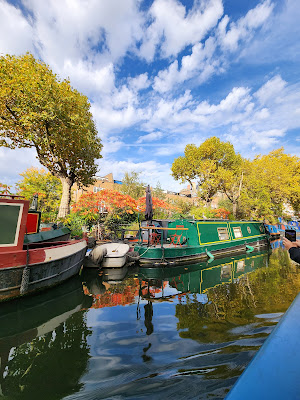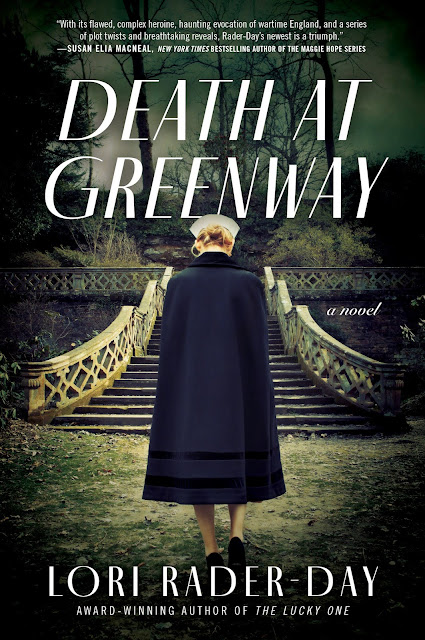DEBORAH CROMBIE: It is always an enormous treat to have award-winning author Lori Rader-Day visit us on Jungle Red (except for the fact that I think Lori was trying to torture me to death with this post!) And TREAT is the operative word here, as you will see. (You might want to prepare yourself by making a cuppa, because otherwise you will have to get up and make a pot or two once you start reading--and drooling over these photos...)
It’s tea time somewhere
By Lori Rader-Day
In 1997 I went innocently to England to visit a friend,
packing my soda addiction and bringing back a tea habit. Tea for breakfast. Tea
in the afternoon. Tea for a pick-me-up, a nice cuppa tea when I arrived back
home from errands or at any new stage of the day, really, always served “white”
with milk.
Do you know how much easier it is to get Dr. Pepper in
England than it is to get a proper brew, English breakfast, with milk, once I
was back in America? Even at, say, a mystery conference? But sometimes it’s
difficult to get a good cup of tea even in England. Even at, say, Agatha
Christie’s house.
Researching my new novel Death at Greenway, I was
able to visit Christie’s beloved holiday home Greenway twice, once staying
three nights in the house as the guest of the National Trust, thanks to a
connection made by Sophie Hannah. (Was it wonderful? Oh, yes, and absolutely
essential for the book’s verisimilitude.) But we had no access to kitchen or
kettle. England gave me a tea jones and then wouldn’t provide it until 10 a.m.
when my husband and I were the first customers at the café when the staff and
volunteers opened up. We made our breakfast from the cream tea menu. “Cream tea”
means scones and is less a meal than an excuse to have a conveyance of clotted
cream and jam to one’s mouth. Pure decadence.

I love tea: just “builder’s” black tea. Not green. Not
cinnamon. Not mint. Not herbal, which is just flowers floating in water, or
Earl Grey, which tastes like a sweater. Researching an English story in
England, I had the chance to have every variation of the tea meals served there:
a “bad” cup of tea that was still refreshing in Paignton, weary from travel. A wonderful
cream tea in Soar to make up for backtracking to retrieve coats left behind at
the inn where the sea crashed against the coast, a place that also worked
itself into the book.
I have had tea up and down the countryside of England in the
name of research, from South Devon down near Dartmouth and the Channel where
Greenway is situated to the famous Bettys Teashop when I attended Theakston
Old Peculiar Crime Festival, colloquially known as “Harrogate” for the
town in the north where it takes place each year.
But can I get posh for a moment? What I truly love is afternoon
tea.
Afternoon tea is the one you’re thinking of, ladies in hats.
Perhaps you have called it high tea before and now never will again, OK? High
tea is supper, fish and chips and such in a pub, not fancy at all, not necessarily
featuring tea, the drink. It is called that perhaps because one eats high tea up
at the table, while afternoon tea is taken in comfortable, low chairs in the
room where visitors linger. (You can learn more about the socioeconomic history
of the differences here.)
Afternoon tea is a delight, a special occasion. We have no
real American equivalent to afternoon tea. A snack? Is there any precision, any
pomp or history to a snack?
Shall I be mother and serve you the three tiers of afternoon
tea?
Along with your actual tea, we have on the bottom tier some tiny
sandwiches, perhaps egg salad or cucumber and butter? Savory bites here are
welcome, as we’ll get to many sweet options soon. My friend and author Mary
Anne Mohanraj hosted a tea party launch for Death at Greenway in her
English garden and served all the above plus what she calls “ribbon
sandwiches,” with three layers, one each of beets, carrots, and spinach.
(Recipe and description here
but also check out her Patreon subscriptions
and cookbook.) I
don’t even like beets but love ribbon sandwiches.
But save room because on the second tier we have scones,
served with clotted cream and jam or lemon curd, and we can argue over which is
applied first later. The important thing is to get your scone loaded with both cream
and jam and heading toward your mouth.
And we’re not even finished. Consider the top tier: tiny
teacakes, perhaps some fondant involved, the sort of thing many contestants on
Great British Bake-Off never perfect. Also biscuits, pâtisserie—there are no
absolute rules to what might appear on the tray, and that’s part of the fun, to
see what each host chooses to serve their guests. Like the mango trifle Mary
Anne prepared for our launch party…
(You can find some recipes and ideas for hosting your very
own afternoon tea here.)
The top tier are sweets, the likes of which makes most of us
think of Paree, dessert after what has essentially been a meal of
dessert. Maybe it’s too much?
Well, perhaps just one. If you insist. You’ve gone to
all this trouble. It would be rude not to.
And of course we’ll finish off the pot of tea to wash it
down. Afternoon tea is an event lasting as long as the tea and conversation
flow. The whole point of afternoon tea is that the small bites don’t get in the
way of talking. It’s a treat to be shared with friends, something special for
visitors.
England and its people have been so generous with sharing
their country, history, and pleasures with me throughout the process of researching
and writing Death at Greenway and now? Well, sometimes afternoon tea is
served with champagne when the occasion calls for celebration. I’m raising my
glass in your direction. Thank you, my lover (as they say to good friends in
Devon), and cheers!
Photos of the Serendib House Death at Greenway tea party
launch were taken by John Thomas Bychowski. Poisoned portrait and tea cup stack
photos were taken by Justin Barbin Photography. All other photos are courtesy of
the author or her friends.
Lori Rader-Day is the Edgar Award- and Agatha
Award-nominated and Anthony Award- and Mary Higgins Clark Award-winning author
of The Lucky One and Under a Dark
Sky. She lives in Chicago, where she co-chairs the Midwest Mystery
Conference and teaches creative writing at Northwestern University. Her newest
book, Death at Greenway, is based on a little-known moment in history,
when a group of London children were evacuated from the Blitz during World War
II to Agatha Christie’s holiday estate. Visit her at www.LoriRaderDay.com, Facebook,
Twitter, and Instagram.


DEBS: When you've finished swooning over the goodies above, can I just add that Lori's book is delicious as well? It is so atmospheric and gripping and just creepy enough to make you want to curl up under a rug (that's British for a throw) with your very own cup of English Breakfast. Or maybe even Earl Grey. (I like Earl Grey but Lori's description made me snort. I totally get it. And I agree about all the other tea flavors. Just no.)
READERS, tell us about your favorite afternoon tea experiences? And who has visited Greenway?



.jpg)

















































